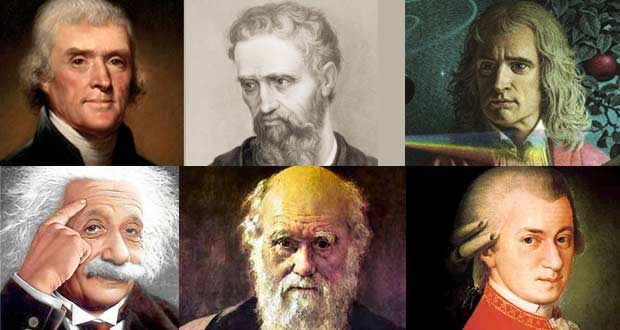6 historical geniuses with autism

Autism Spectrum Disorder (ASD) is perhaps the most complex and controversial neurological disorder because each person with autism is different from the other. People with autism do not have learning disability but lack a lot of other skills which are needed for leading a fulfilling life in a society. Characteristic features of autism spectrum disorders (ASD) include lack of socialising skills, repetition of some action or behavior, coordination problems and strong visual skills. ASD was not known until the 20
th century, but researchers suspect that a lot of geniuses in the past could have suffered from the disorder. Here are six influential people with autism you will be surprised to know.
1. Albert Einstein: Although scientists are yet to understand the complete neurological pathways and the underlying mechanism of autism, researches at Cambridge University suggest that Noble Laureate Albert Einstein could have suffered Asperger’s syndrome. Ioan James in the article ‘Singular Scientists’ that was published in the Journal of the Royal Society of Medicine, mentions that Einstein displayed a lot of signs of autism. He has been described a lonely and dreamy child who had difficulty in making friends. He lacked social skills, was obsessed and forgetful when he was young.
2. Issac Newton: Baron-Cohen, the head of the autism research centre at Cambridge, suggested that along with Einstein, Sir Issac Newton also showed signs of autism. Newton barely spoke, was sensitive to criticism, rarely made intimate friends and was extremely jealous. Researchers believe that such people are very impatient with others who have a slow intellectual and grasping power, which is why they choose to be isolated.
3. Thomas Jefferson: Thomas Jefferson, revolutionary leader and 3rd president of the United States, also joins the list of historic autistic achievers. There have been a lot of speculations regarding neurosis displayed by Jefferson. In a review of the book ‘The ADHD-Autism Connection: A Step Toward More Accurate Diagnosis and Effective Treatments,’ by Diane M. Kennedy, Thomas Jefferson’s name has been mentioned in the list of influential people in the past who showed symptoms that can be attributed to autism. A clear direction to this speculation is provided in the book ‘Diagnosing Jefferson: Evidence of a Condition That Guided His Beliefs, Behavior, and Personal Associations,’ by Norm Ledgin which describes Jefferson as an aloof person who had speech difficulties and sensitivity to loud noise.
4. Michelangelo di Ludovico Buonarroti: Michelangelo was one of the greatest artists of the ancient era, whose versatility and creativity was evident through his sculptures, paintings and poems. A study by Arshad M and Fitzgerald M presented evidence that Michelangelo indeed showed symptoms of Asperger’s syndrome. He was a loner because of his poor social interests and lack of communication skills. He worked single-mindedly and was totally obsessed with his masterpieces. The study also mentions that his obsessive nature was completely unaffected by his medical problems.
5. Charles Darwin: Known for his immense contribution to the theory of evolution, Charles Darwin had an intriguing behaviour which was brought into the limelight by Prof Michael Fitzgerald. In his research, Fitzgerald offers several facts suggesting that Darwin could have been an autistic. His self-loving nature, avoidance of direct communication, unique way of thinking and looking at things that have been mentioned in biographies and literature clearly indicates that he was autistic.
6. Wolfgang Amadeus Mozart: Mozart was a remarkable composer of his times and probably the greatest musician the world has ever known. He was genius as a child and focused only on music since the age of five years. There are a number of reports that linked Mozart’s behaviour with multiple neurological disorders including Tourette’s syndrome and Asperger’s syndrome. His obsession with his thoughts and inanimate objects, repetition of certain movements, unusual facial expressions and erratic mood swings typically indicated that he could have been autistic.
References:
Arshad M, Fitzgerald M. Did Michelangelo (1475-1564) have high-functioning autism?
Singular scientists Ioan James. Singular scientists
Jeffrey J. Globus. The ADHD-Autism Connection: A Step Toward More Accurate Diagnosis and Effective Treatments
Aidin Ashoori and Joseph Jankovic. Mozart’s movements and behaviour: a case of Tourette’s syndrome?
You may also like to read:
World Autism Awareness Day 2014 – Not enough doctors to treat autism in India
Teach empathy to your child with autism – start with saying sorry
Simple way to help detect autism earlier – a five minute questionnaire
Simple way to help detect autism earlier – a five minute questionnaire
For more articles on autism, visit our autism section. Follow us on Facebook and Twitter for all the latest updates! For daily free health tips, sign up for our newsletter. And to join discussions on health topics of your choice, visit our forum.


